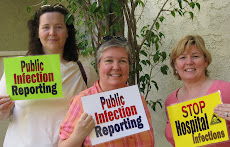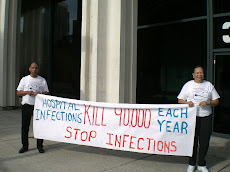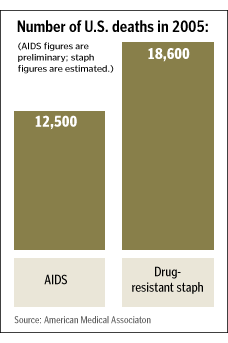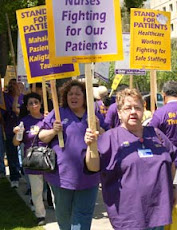http://www.twincities.com/ci_9316658?IADID=Search-www.twincities.com-www.twincities.com
St. Paul Pioneer Press
Part III in our series
Critics say drug firms' payments to doctors are conflict of interest
What they spend: A look at drug company spending in Minnesota ― on top specialties and select psychiatrists.
By Jeremy Olson and Paul Tosto Pioneer Press
Article Last Updated: 05/20/2008 07:25:43 AM CDT
Drug companies have given $88 million in gifts, grants and fees to Minnesota doctors and caregivers since 2002, according to state payment records, including $782,000 to the two University of Minnesota psychiatrists who oversaw Dan Markingson's participation in a clinical drug trial.
A lawsuit over Markingson's suicide, which happened during the drug trial, accused Dr. Stephen Olson and Dr. S. Charles Schulz, chairman of the U's psychiatry department, of coercing the schizophrenic Markingson into the study.
The lawsuit, brought by Markingson's mother, Mary Weiss, charged that the doctors were under pressure to recruit patients such as Markingson to maximize payments from AstraZeneca and gain prestige by participating in the drug company's national study.
Both doctors said in court depositions that their roles were appropriate and that the money didn't influence their decisions over Markingson ― including when his mother argued that he wasn't getting better in the study and should be withdrawn.
Schulz was dismissed from the lawsuit in February; Olson settled this spring for an amount a university official described as little more than court costs. Federal reviews of the death didn't result in any penalties against the doctors or the university.
The case nonetheless offered an inside look at the kind of financial payments to doctors that some health policy experts and congressional representatives say should be restricted or at least fully disclosed to the public.
It also scrutinized the ethics of drug company funding of research ― something that has received less public attention and criticism than the free lunches, dinners and trips that drug companies have provided to doctors to promote their drugs.
Markingson, 27, killed himself May 8, 2004, in the bathroom of a West St. Paul halfway house. He had been enrolled for more than five months in the university's "CAFE" study, which compared three antipsychotic drugs.
Weiss sued the university and the psychiatrists. In an interview, she said doctors have a conflict of interest when they are financially benefiting from studies and caring for patients in those studies at the same time.
"I think they lose sight that these are people," she said, "not their own special little guinea pigs."
Minnesota is unique in requiring drug companies to report how much money they give to each doctor, but the reporting system has limitations. It doesn't always distinguish between money for a doctor's travel expenses and money for a research trial, nor does it distinguish money that was in a doctor's name but was passed directly to a research institution.
U.S. Sen. Chuck Grassley, R-Iowa, is urging a national reporting system. Grassley held a hearing last year in which two doctors said their colleagues have become trapped by the lures and pressures of drug company money.
"Physicians face a difficult choice," testified Dr. Greg Rosenthal, an Ohio eye specialist. "One path is to go along. With drug company money, you can increase your income, prestige, build your practice or fund a department, research or professorships. The middle ground is to simply look away. The hard choice is to fight back."
Olson received $220,000 from six companies since 2002, including $149,000 from AstraZeneca, according to the state records. Schulz received $562,000, including $112,000 as a researcher and consultant to AstraZeneca.
Olson said his AstraZeneca money went straight to the U but did support his salary. Markingson's full participation in the yearlong study meant up to $15,000 for the university.
The amounts aren't unusual, according to the payment records collected by the Minnesota Board of Pharmacy. The records, which were updated this month to include 2007 figures, show 167 Minnesota doctors who have received $100,000 or more since 2002. One in four psychiatrists has received funding from pharmaceutical companies, averaging about $50,000 over the six years.
Greater awareness of drug company payments has prompted tighter rules among some Minnesota health care organizations. The Mayo Clinic prohibits its doctors from being paid by drug companies to serve on their speaker's bureaus. Doctors in speaker's bureaus give lectures to other doctors about the company's medications.
The St. Mary's clinic system in Duluth recently banned pens, mugs or other freebies bearing drug company logos.
There have been fewer steps to restrict drug company funding of research, though most medical journals long ago required doctors to disclose the funding source of any research results they publish. Some health officials are now questioning the drug companies' use of "ghostwriters" to revise articles about research results to promote the drugs they sell.
Many universities view industry-sponsored research as a necessity amid tightening state and federal science budgets. Drug company funding makes up less than 7 percent of the psychiatry department budget at the University of Minnesota, but Schulz said it is needed as the U tries to move up the list of top-funded U.S. research institutions.
Since Olson was recruited in 2001 to boost the university's expertise in schizophrenia, he has led the U's efforts in three drug trials funded by AstraZeneca. He also took part in the federally funded "CATIE" trial, which suggested that older antipsychotic drugs were as effective as AstraZeneca's Seroquel and other newer drugs.
A growing body of research suggests that drug company money has an influence on study outcomes. One analysis found that industry-funded research was four to five times more likely to produce positive outcomes for a paying company's drug than federally funded research. A report last year found that drug company-funded studies of cholesterol medications were much more likely to produce results that favored their own drugs as well.
The CAFE results didn't show that AstraZeneca's Seroquel offered much benefit over two competitors ― Zyprexa and Risperdal. Patients gained control over schizophrenic symptoms and tended to stop taking the medications at the same rate, regardless of which drug they took. The level of unhealthy weight gain was comparable, too, albeit slightly higher among the Zyprexa patients.
Weiss sued AstraZeneca as well, though the company also was dismissed from the lawsuit. Her attorneys argued that AstraZeneca's goal with the CAFE study was to gain a marketing edge and that the company used selective information from the study to promote Seroquel.
The attorneys cited internal documents, which have been sealed under court order, in which AstraZeneca discussed its use of ghostwriters and strategies to present CAFE results in a way that "sells" Seroquel.
AstraZeneca declined to discuss documents from the case, but brand corporate affairs manager Abigail Baron said the company's financial arrangements with doctors are necessary to improve health through drug discovery.
"That mission cannot be fulfilled," she said, "without close partnership with those on the front lines of patient care and ... research."
Jeremy Olson can be reached at 651-228-5583 or jolson@pioneerpress.com. Paul Tosto can be reached at 651-228-2119 or ptosto@pioneerpress.com.
How Much?
Visit our database of drug company payments to Minnesota doctors Related to This series
Patient's suicide raises questions
Dan Markingson had delusions. His mother feared that the worst would happen. Then it did.
Subscribe to:
Post Comments (Atom)









No comments:
Post a Comment